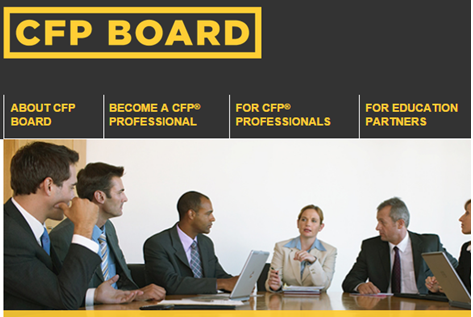Passing the Certified Financial Planner Exam – Overview
Passing the CFP exam and becoming a Certified Financial Planner will give you a big boost in your authority as a financial planner.
As some of the most respected professionals in the financial planning field, Certified Financial Planners enjoy better job prospects, higher prestige, and improved job security—among many other benefits.
However, in order to become a Certified Financial Planner, you have to pass the Certified Financial Planner (CFP) exam.
It’s not easy, and it tests not only your knowledge of financial planning concepts but your ability to apply them in hypothetical situations.
If you want to knock out the CFP exam on the first try and take your financial career to the next level, follow these 6 tips to boost your chances.
6 Tips on Passing the Certified Financial Planner Exam
1. Know What You Are Up Against
The Certified Financial Planner exam is administered by the Certified Financial Planner Board of Standards.



Image source: Certified Financial Planner Board of Standards
Here are some other facts you should know about the Certified Financial Planner exam:
- The CFP exam is given three times a year, on the third Friday/Saturday of March, July, and November.
- The fee for taking the exam is $595
- The CFP exam is 10 hours long, split between Friday and Saturday
- Applicants must hold a bachelor’s degree and have at least three years’ experience in the investment industry
- The exam covers various aspects of investment planning, retirement planning, estate planning, insurance planning, employee benefits planning, and risk management
- The exam includes a detailed case study at the end of each section
- The exam has a passing rate of 50-60%
2. Practice Your Case Studies
The Certified Financial Planner exam includes detailed case studies at the end of each section.
Case study questions account for roughly 20% of the exam’s total questions, and candidates often describe case studies as the most difficult part of the exam.
Each case study gives roughly ten pages of detailed information about a hypothetical client.
Cash flow and balance sheets are provided, and the financial situation of the client is often made complex (for example, by adding divorce and other complex scenarios).
Candidates must then answer a series of questions which test their ability to apply academic concepts to the case.
Any decent review sessions, prep course or study guide will offer practice case studies.
It’s smart to practice as much as possible and get comfortable with the application of concepts to hypothetical situations.
Performing well on the case studies can make the difference between passing and failing the Certified Financial Planner exam.
All-in-One Change Management Tools
Top Rated Toolkit for Change Managers.
Get Your Change Management Tool Today...
3. Brush Up On Your Taxes
It’s interesting to note that lawyers and Certified Public Accountants (CPAs) have particularly high pass rates on the Certified Financial Planner exam. The reason is simple: taxes.
Candidates with a background in taxes have a huge advantage over those who do not.
This doesn’t mean you have to become a CPA in order to pass the exam. However, establishing a basic command of tax laws and concepts will go a long way.
Some financial professionals recommend focusing on the tax-related material first, before studying the other areas of the curriculum.
If you want to be extremely prudent, sit for the IRS Enrolled Agent Exam.
This can be a great way to prepare for the Certified Financial Planner exam.
4. Take a Review Course
Your options for review courses are virtually endless.
Many organizations offer in-person review courses, complete with comprehensive practice exercises.
However, if you don’t have the time or money to spare, you can opt for online courses.
There is also a plethora of study books available online.
Whether online or in person, some form of guided review is always preferable to mere book study.
Candidates who prepare for the Certified Financial Planner exam under the guidance of someone who has actually sat for and passed the exam have much greater chances of passing on the first try.



5. Avoid Last-Minute Cramming
Your chances of passing the Certified Financial Planner exam are highest when you’ve integrated the material meticulously over a long period of time.
As the bid day approaches, a certain amount of review is good.
However, cramming too much will make you tense and may affect your performance on exam day.
It’s better to go in well-rested and confident in the preparatory work you’ve done.
6. If You Fail, Keep Studying
Statistics show that the odds of passing the Certified Financial Planner exam are highest on the first attempt.
This would mean that for the 40-45% of candidates who fail the test, their odds of passing actually decreases on the second or third attempt.



Image source: Pexels
Don’t let this statistic fool you.
Many of the candidates who fall into these categories are simply not preparing adequately for the re-take.
Perhaps they feel like they missed by only a few points and only need light study before they try again.
In some cases, they might be busy professionals who aren’t putting in the proper time to prepare.
If you fail the Certified Financial Planner (CFP) exam on the first try, don’t be discouraged.
Those who pass the exam on the second attempt have one thing in common: preparation.
Since candidates are given only a pass/fail notification, it can be difficult to know which areas of the test were most difficult for you.
It helps to visualize the test and remember where you struggled.
Taxes and case studies are two areas where most candidates struggle, so paying extra attention to these areas is a good bet.
AdvisoryHQ (AHQ) Disclaimer:
Reasonable efforts have been made by AdvisoryHQ to present accurate information, however all info is presented without warranty. Review AdvisoryHQ’s Terms for details. Also review each firm’s site for the most updated data, rates and info.
Note: Firms and products, including the one(s) reviewed above, may be AdvisoryHQ's affiliates. Click to view AdvisoryHQ's advertiser disclosures.





